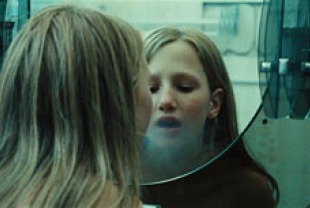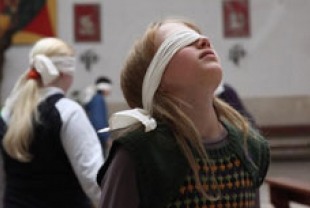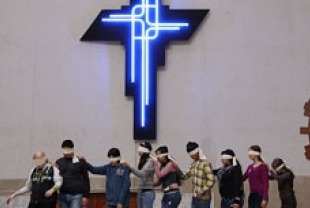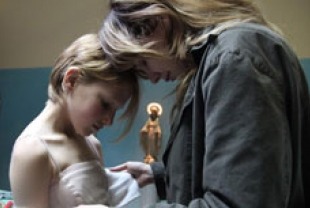Marta (Yle Vianello), a quiet 12 year old, her working-class mother Rita (Anita Caprioli), and her bossy older sister, have moved back to their hometown of Calabria, Italy, after spending a decade in Switzerland. Lonely and without friends, the preteen feels like she's from another planet. Marta is close to her mother who works in a bakery; she surprises their relatives by making a cake for her sister's 18th birthday.
Community life in Calabria revolves around the Catholic Church. The first scene in the film is a religious festival at dawn. Since all the children must attend confirmation class, Marta enrolls, even though she doesn't know much about Catholicism. The other children are bored to death with the lessons taught by a middle-aged woman, Santa (Pasqualina Scuncia), who is very close to Father Don Mario (Salvatore Cantalupo).
In one of their exercises, members of the catechism class are blindfolded and challenged to feel what the blind man experienced before being healed by Jesus. They cautiously stumble their way around the open space of the sanctuary. It is a fitting and creative metaphor for youth who have lost their way. As one observant member of the congregation says — the church is mainly for old people and toddlers.
Santa asks Father Don Mario to listen to the children as they sing a song for confirmation day, but it's obvious he can't wait to leave. Marta is present when he visits their small apartment to collect rent and to insist that as good Catholics they must sign up to vote for a politician who favors the interests of the church.
In her debut feature, writer and director Alice Rohrwacher has done a remarkable job mapping Marta's physical and spiritual coming-of-age. Her slow-moving film gives us time to savor the wreckage of the small town and the moral disarray of the community. At the church, Marta has two run-ins with her teacher. In the first she is reprimanded for laughing out loud when the woman falls down. Marta feels guilty and cuts her own hair.
In the second incident, she discovers a box containing little kittens. The teacher tells her to put them down since they are ridden with disease. A man takes the kittens away in a bag. The defiant Marta follows him, even though it is her confirmation day. When he tosses the kittens off a bridge, she walks through the water which now puts her symbolically on her own spiritual path. The priest spots her later as she wanders on the highway and takes her on an errand to pick up a "figurative cross" (on with Jesus's body is visible). He drives to a nearly abandoned village in the mountains.
At the village church, Marta meets an old priest and asks him the meaning of Jesus' cry from the cross. He shares with her his radical vision of Jesus as an angry and furious man filled with pain. She runs her hands over Jesus' body on the cross, which seems more real to her than the holy body the church talks about. Later, she gets her period and is told to clean herself up by Don Mario because she is dirty.
All of these incidents drive this non-conformist away from the Catholic church. Like millions of others in Europe and the United States she is spiritual but not religious. She feels connected with the humanity of the angry and rebellious Jesus and has a compassionate heart as demonstrated with her attempt to rescue the kittens. She is dismayed with Father Don Mario and his aloofness from people, his chauvinism, and his attempts to better his standing in the church. Finding her own spiritual path is the way to go and, as a result, Marta is blessed with a miniature miracle which lifts her spirit, a sign of grace at large in her new life.
Special features on the DVD include a bonus short film: Raju.



